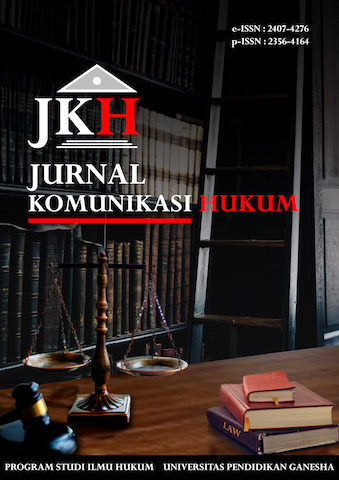PEMENUHAN HAK REKREASIONAL TERHADAP NARAPIDANA ANAK DI LEMBAGA PEMBINAAN KHUSUS ANAK (LPKA) KELAS I MEDAN
DOI:
https://doi.org/10.23887/jkh.v8i2.48291Abstract
This journal discusses and analyzes the duties and functions of the Class I Medan Special Child Development Institute (LPKA) in providing guidance and fulfillment of children's rights while in LPKA, one of which is about the fulfillment of recreational rights for students. Recreational activities given to children while in LPKA have a significant impact, namely being able to reduce stress levels in children during the coaching period. In Law No. 11 of 2012 concerning the Juvenile Criminal Justice System in article 3 states that every child in the criminal justice process has the right to carry out recreational activities, but in fact it was found that the Medan Class I LPKA has not carried out the fulfillment of recreational rights optimally. The research method used in this study is a qualitative method and data collection through interviews, observation, documentation and library research. The results show that the fulfillment of recreational rights has not run optimally. It is not clearly regulated how the mechanism for granting recreational rights is and only relies on the policy of the head of the LPKA. The inhibiting factors for the implementation of recreational activities are as follows: limited budget, inadequate facilities, low enthusiasm of students.
Downloads
Published
How to Cite
Issue
Section
License
Authors who publish with this journal agree to the following terms:- Authors retain copyright and grant the journal right of first publication with the work simultaneously licensed under a Creative Commons Attribution License that allows others to share the work with an acknowledgement of the work's authorship and initial publication in this journal.
- Authors are able to enter into separate, additional contractual arrangements for the non-exclusive distribution of the journal's published version of the work (e.g., post it to an institutional repository or publish it in a book), with an acknowledgement of its initial publication in this journal.
- Authors are permitted and encouraged to post their work online (e.g., in institutional repositories or on their website) prior to and during the submission process, as it can lead to productive exchanges, as well as earlier and greater citation of published work (See The Effect of Open Access).
Authors who publish with this journal agree to the following terms:
- Authors retain copyright and grant the journal right of first publication, with the work [SPECIFY PERIOD OF TIME] after publication simultaneously licensed under aCreative Commons Attribution License that allows others to share the work with an acknowledgement of the work's authorship and initial publication in this journal.
- Authors are able to enter into separate, additional contractual arrangements for the non-exclusive distribution of the journal's published version of the work (e.g., post it to an institutional repository or publish it in a book), with an acknowledgement of its initial publication in this journal.
- Authors are permitted and encouraged to post their work online (e.g., in institutional repositories or on their website) prior to and during the submission process, as it can lead to productive exchanges, as well as earlier and greater citation of published work (See The Effect of Open Access).












